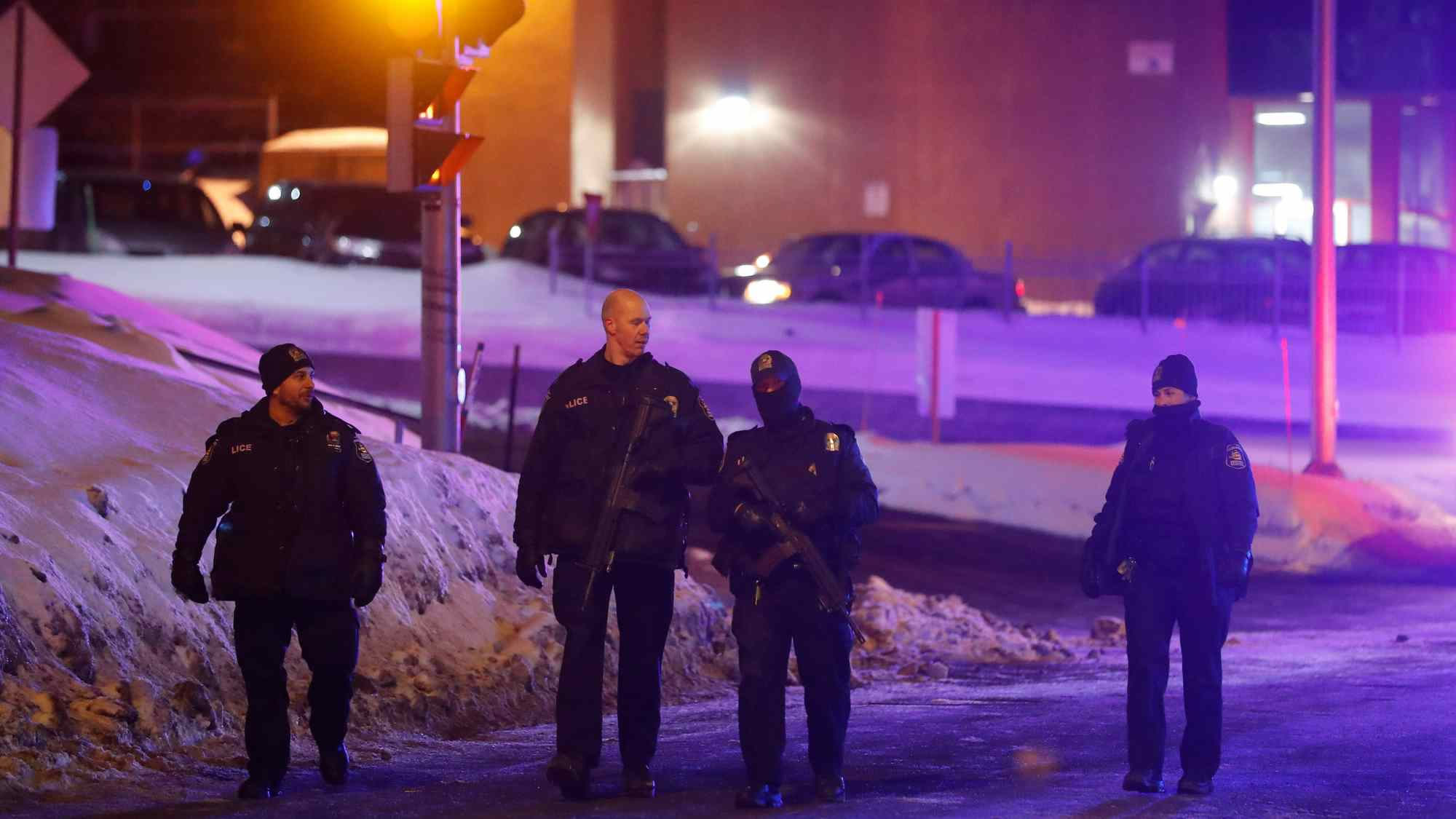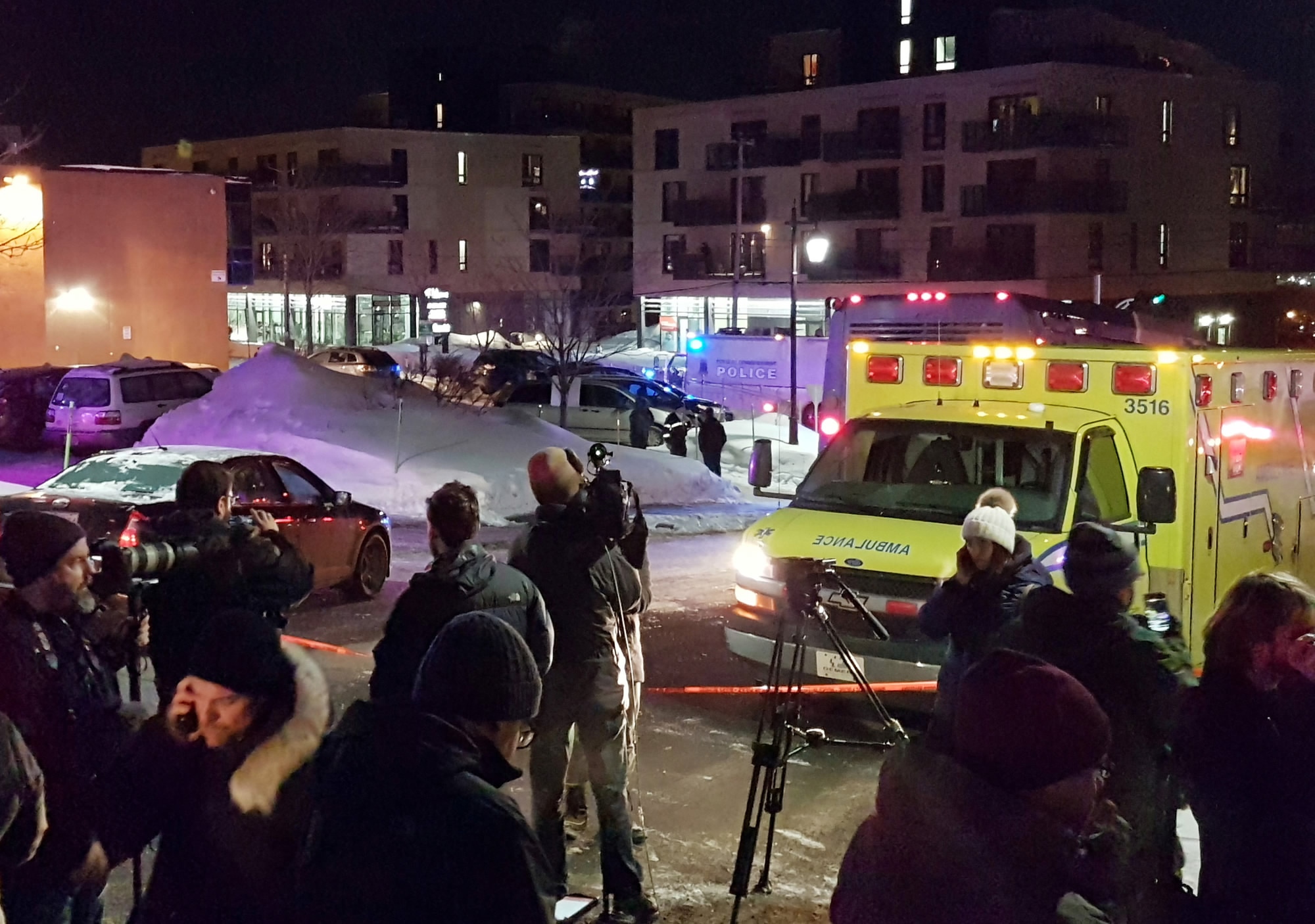
China
15:22, 30-Jan-2017
Six killed in Quebec City mosque shooting, PM calls it 'cowardly attack'
Updated
10:38, 28-Jun-2018

Six people were killed and eight injured after gunmen opened fire in a Quebec City mosque during evening prayers on Sunday, according to local police.
A witness told Reuters that up to three gunmen shot about 40 people inside the Quebec City Islamic Cultural Center.
"Why is this happening here? This is barbaric,” said the mosque's president, Mohamed Yangui.
Quebec police on the scene said two people have been arrested and did not rule out the possibility of a third suspect who had fled the scene.
Quebec provincial police were considering whether it was an act of terrorism, according to an intelligence source who declined to be identified. There were no immediate details on the suspects.
"There are many victims ... there are deaths," a Quebec police spokesman told reporters.

SWAT team police officer walk arournd a mosque after a shooting in Quebec City, Canada on January 29, 2017. /CFP Photo
SWAT team police officer walk arournd a mosque after a shooting in Quebec City, Canada on January 29, 2017. /CFP Photo
Police tweeted later that the situation was under control and that the mosque had been secured and occupants evacuated.
Yangui, who was not inside the mosque when the shooting occurred, said he got frantic calls from people at evening prayers. He did not know how many were injured, saying they had been taken to different hospitals across Quebec City.
"Tonight, Canadians grieve for those killed in a cowardly attack on a mosque in Quebec City. My thoughts are with victims & their families," Canadian Prime Minister Justin Trudeau tweeted.
Quebec's prime minister, Philippe Couillard, said in a series of Twitter posts that the government was "mobilized to ensure the security of the people of Quebec."
"Quebec categorically rejects this barbaric violence," he wrote. "Solidarity with Quebec people of Muslim faith."

An ambulance is parked at the scene of a fatal shooting at the Quebec Islamic Cultural Center in Quebec City, Canada on January 29, 2017. /CFP Photo
An ambulance is parked at the scene of a fatal shooting at the Quebec Islamic Cultural Center in Quebec City, Canada on January 29, 2017. /CFP Photo
The attack comes as Canada has vowed to open its door to Muslims and refugees after US President Donald Trump's controversial immigration ban Friday sparked travel chaos and outrage around the world.
Canada will offer temporary residence permits to people stranded in the country as a result of Trump's order, the immigration ministry said Sunday.
According to the latest Canadian census, from 2011, one out of five people in the country are foreign-born.
Canada has welcomed more than 39,670 Syrian refugees between November 2015 and early January 2017, according to government figures.
'Not safe here'
Like France, Quebec has struggled at times to reconcile its secular identity with a rising Muslim population, many of them North African emigrants.
In June 2016, a pig’s head was left on the doorstep of the cultural center.
"We are not safe here," said Mohammed Oudghiri, who normally attends prayers at the mosque but not on Sunday.
Oudghiri said he had lived in Quebec for 42 years but was now "very worried" and thinking of moving back to Morocco.
Mass shootings are rare in Canada, which has stricter gun laws than the United States, and news of the shooting sent a shockwave through mosques and community centers throughout the mostly French-language province.
"It’s a sad day for all Quebecers and Canadians to see a terrorist attack happen in peaceful Quebec City," said Mohamed Yacoub, co-chairman of an Islamic community center in a Montreal suburb. "I hope it’s an isolated incident."
Incidents of Islamophobia have increased in Quebec in recent years. The face-covering, or niqab, became a big issue in the 2015 Canadian federal election, especially in Quebec, where the vast majority of the population supported a ban on it at citizenship ceremonies.
In 2013, police investigated after a mosque in the Saguenay region of the province was splattered with what was believed to be pig blood. In the neighboring province of Ontario, a mosque was set on fire in 2015, a day after an attack by gunmen and suicide bombers in Paris.
Zebida Bendjeddou, who left the mosque earlier on Sunday evening, said the center had received threats.
"In June, they'd put a pig's head in front of the mosque. But we thought: 'Oh, they're isolated events.' We didn't take it seriously. But tonight, those isolated events, they take on a different scope," she said.
Bendjeddou said she had not yet confirmed the names of those killed, but added: "They're people we know, for sure. People we knew since they were little kids."
(With inputs from Reuters and AFP)
10353km

SITEMAP
Copyright © 2018 CGTN. Beijing ICP prepared NO.16065310-3
Copyright © 2018 CGTN. Beijing ICP prepared NO.16065310-3